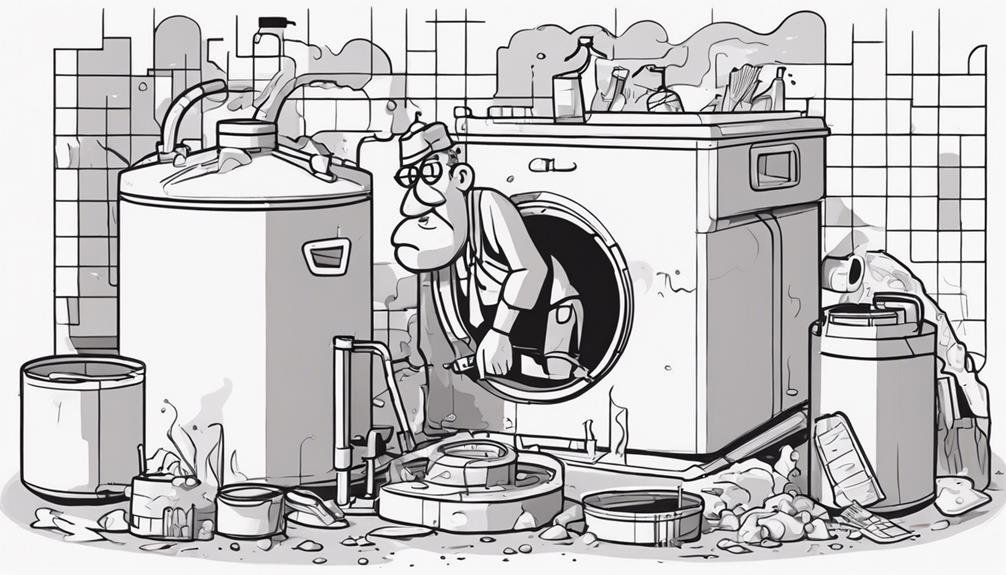When it comes to your septic tank, the nose knows. That unmistakable odor wafting from your system can signal a variety of underlying issues.
From simple fixes to more complex problems, understanding the source of the stench is key to maintaining a healthy and odor-free septic system.
Let's uncover the causes, signs, and solutions to help you breathe easier and ensure your home remains a fragrant haven.
Key Takeaways
- Regular maintenance and inspections prevent septic odor issues.
- Proper waste disposal and pumping schedules are crucial for odor control.
- Implement odor neutralizers and vent pipe filters for effective odor management.
- Timely address leaks, cracks, and ventilation problems to minimize septic tank odors.
Common Causes of Septic Odors

If you notice foul odors coming from your septic tank, it's essential to identify the common causes promptly to address the issue effectively. Odor detection plays a crucial role in maintaining a healthy septic system. One common cause of septic odors is a lack of proper septic tank maintenance. Neglecting regular pumping and inspections can lead to the buildup of solid waste and scum, causing unpleasant smells to emanate from the tank.
Additionally, leaks or cracks in the septic tank or its components can allow gases to escape, resulting in foul odors. It's important to inspect the tank and its connections regularly to ensure everything is intact. Inadequate ventilation in the septic system can also contribute to odor issues. Proper airflow is necessary to prevent the accumulation of gases that can cause unpleasant smells.
To address septic tank odors related to maintenance issues, it's recommended to schedule routine pumping and inspections by a qualified professional. Keeping up with regular maintenance tasks can help prevent odor problems and ensure the proper functioning of your septic system.
Signs of Septic Tank Odor
Detecting signs of septic tank odor early on is essential for maintaining a healthy septic system and addressing potential issues promptly.
The most obvious sign of septic tank odor is the presence of foul smells around your property, especially near the drain field or septic tank area. If you notice a rotten egg or sewage-like smell lingering in the air, it could indicate a problem with your septic system.
Another indicator is slow draining sinks, toilets, or showers, which might suggest a clog or backup in the system. Additionally, patches of overly lush grass or pooling water above the septic tank could signal a leak.
When faced with septic tank odor issues, there are troubleshooting tips you can follow. First, check for any visible signs of leaks or standing water around the septic tank. Next, ensure that all plumbing fixtures are properly vented to prevent sewer gases from escaping into your home.
Regularly inspect the tank for cracks or damage that could be causing the odor. By promptly addressing these signs and following troubleshooting tips, you can mitigate septic tank odor problems and maintain a functioning system.
Prevention and Maintenance Tips

To prevent septic tank odor issues, regularly schedule professional inspections and maintenance for your septic system. Regular pumping is essential to prevent the buildup of solid waste in the tank, which can lead to foul odors escaping into your home or yard. Proper disposal of items such as grease, chemicals, and non-biodegradable materials is crucial to maintaining a healthy septic system and avoiding odor problems.
In addition to professional maintenance, there are steps you can take to prevent septic tank odors. Be mindful of what you flush down the drains and avoid using excessive amounts of harsh chemicals that can disrupt the balance of bacteria in your septic tank. Implement water conservation practices to prevent overloading the system, which can cause odors to seep out.
Effective Odor Control Solutions
Implementing proper ventilation in your septic system can significantly reduce and control unpleasant odors.
To effectively address septic tank odor issues, consider the following solutions:
- Odor Neutralizers: Utilize specially formulated products that help neutralize odors emitted from the septic system.
- Septic Inspections: Regular inspections by professionals can identify underlying issues causing odors and help in resolving them promptly.
- Vent Pipe Filters: Installing vent pipe filters can capture odor particles before they're released into the air.
- Covering Vent Pipes: By covering vent pipes with activated charcoal filters, you can prevent odors from escaping.
- Proper Drain Field Maintenance: Ensure your drain field is functioning correctly to avoid backup and odor problems.
Conclusion
So, now you know how to tackle those pesky septic tank odors. By addressing the common causes, keeping an eye out for signs, and following preventative maintenance tips, you can keep your system running smoothly and odor-free.
Remember, a stitch in time saves nine when it comes to septic odors. Stay proactive and implement effective odor control solutions to ensure a fresh and clean environment for your home.

